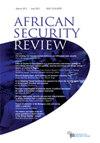Military expenditure, security outcome and industrialisation in Africa: Evidence from a panel data analysis
IF 1.1
Q3 INTERNATIONAL RELATIONS
引用次数: 4
Abstract
ABSTRACT This study examines the cause-and-effect relationship between military expenditure, security outcome and industrialisation for a panel of 35 African countries spanning from 1990 to 2015. We employed: (i) the Pairwise Dumitrescu-Hurlin panel causality test; and (ii) the newly developed panel VAR in generalised method of moment (GMM) estimation approach was applied to determine what magnitude can future disparities in industrialisation be explained by military expenditure and security outcome. The empirical results suggest the existence of a long-run relationship between military expenditure, security outcome and industrialisation. The causality tests reveal that there is feedback causality between the three variables: Military expenditure promotes security outcome and industrialisation in Africa and vice versa. Thus, an appropriate defense and security sector policies will further contribute to the industrialisation process of Africa.非洲的军事开支、安全结果和工业化:来自小组数据分析的证据
本研究考察了1990年至2015年间35个非洲国家的军费开支、安全结果和工业化之间的因果关系。我们采用:(i)双duitrescup - hurlin面板因果检验;(ii)应用新开发的广义矩量法(GMM)估计方法中的面板VAR来确定军事开支和安全结果可以解释未来工业化差距的程度。实证结果表明,军事支出、安全结果和工业化之间存在着长期的关系。因果关系检验表明,三个变量之间存在反馈因果关系:军费开支促进非洲安全成果和工业化,反之亦然。因此,适当的国防和安全部门政策将进一步促进非洲的工业化进程。
本文章由计算机程序翻译,如有差异,请以英文原文为准。
求助全文
约1分钟内获得全文
求助全文

 求助内容:
求助内容: 应助结果提醒方式:
应助结果提醒方式:


